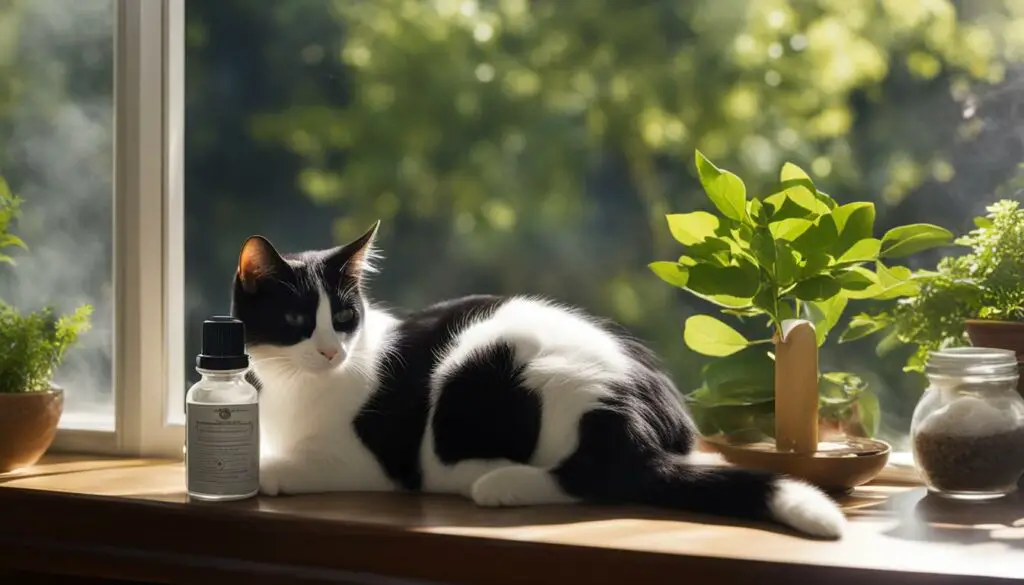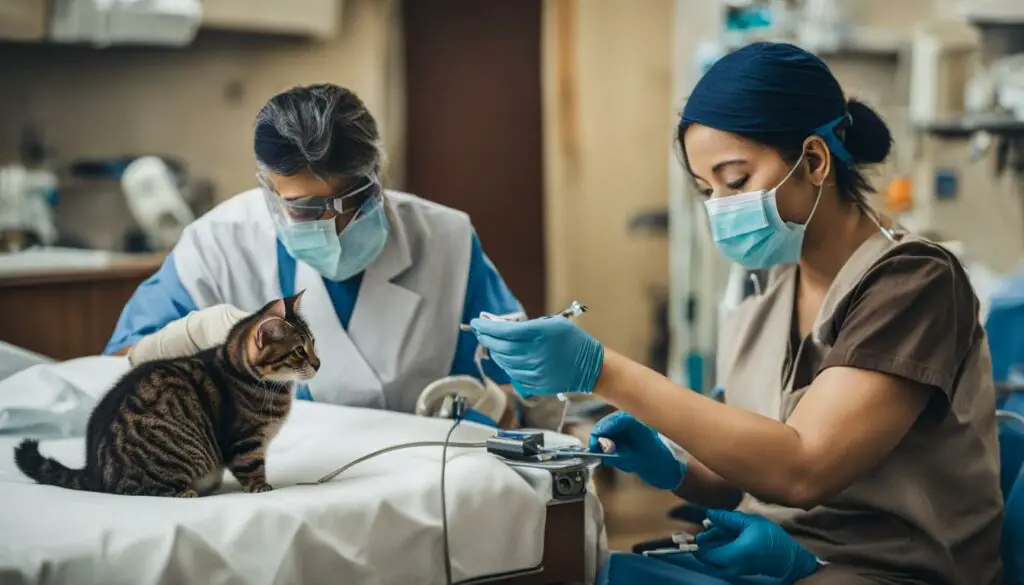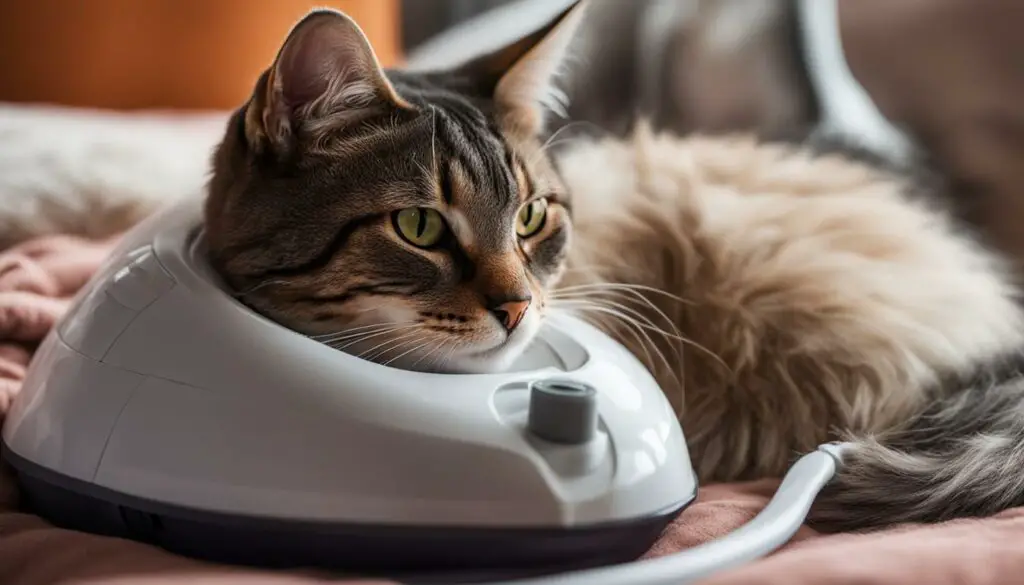Treating cat asthma can be expensive, but it is essential for your cat’s health. The cost of cat inhalers can vary depending on the type of treatment needed. There are different options available, including long-acting cortisone injections, oral cortisone medication, and inhaled cortisone. Each treatment option has its own cost, and it is important to discuss with your vet to determine the best treatment for your cat. Pet insurance may cover the cost of asthma treatments, but it is essential to check with your provider. There are also other treatments available, such as omega 3 fatty acids and environmental control measures, which may help with managing cat asthma. It is crucial to speak to your vet to find the most appropriate and affordable treatment for your cat’s asthma.
Key Takeaways:
- Cat inhaler cost can vary depending on the treatment option and medication needed for your cat’s asthma.
- Long-acting cortisone injections, oral cortisone, and inhaled cortisone are common treatment options, each with its own associated costs.
- It is important to discuss the costs and benefits of different treatment options with your vet.
- Pet insurance may provide coverage for cat asthma treatments, but coverage varies between providers.
- Other treatments, such as omega 3 fatty acids and environmental control measures, may also help manage cat asthma.
The Importance of Cat Asthma Treatment
Treating cat asthma is crucial to ensure the health and well-being of our feline friends. Asthma in cats is a respiratory condition that, if left untreated, can lead to severe breathing difficulties and even life-threatening situations. As responsible pet owners, it is our duty to provide the necessary treatment and care to manage cat asthma effectively.
Asthma in cats can be triggered by various allergens present in the environment. These allergens can cause inflammation and narrowing of the airways, leading to breathing difficulties. By providing treatment for cat asthma, we can reduce the frequency and severity of asthma attacks, allowing our cats to breathe more comfortably and live a better quality of life.
Managing cat asthma involves working closely with a veterinarian to develop a treatment plan tailored to our cat’s specific needs. This may include medication such as cortisone, which helps reduce inflammation in the airways, as well as environmental modifications to minimize exposure to allergens. Regular check-ups with the vet are essential to monitor our cat’s condition and make any necessary adjustments to the treatment plan.
By prioritizing cat asthma treatment and ensuring that our cats receive the necessary medication and care, we can help them lead healthier and happier lives. Remember, early detection and intervention are key in managing this respiratory condition. Consult your veterinarian if you suspect that your cat may be suffering from asthma to get the appropriate diagnosis and treatment.

Different Treatments and Costs
When it comes to treating cat asthma, there are several different options available, each with its own associated costs. The three main types of treatments for cat asthma are long-acting cortisone injections, oral cortisone medication, and inhaled cortisone. Let’s take a closer look at each treatment and the costs involved.
Long-Acting Cortisone Injections
Long-acting cortisone injections are typically given when a cat is first diagnosed with asthma. These injections provide protection for 4-6 weeks and can help manage the symptoms of asthma. The cost per injection is around $80, and the frequency of injections depends on the cat’s response to treatment.
Oral Cortisone Medication
Oral cortisone medication is another common treatment option for cat asthma. It involves administering medication to your cat on a daily basis. The cost of oral cortisone can vary depending on the dosage required, but it typically ranges from $15 to $30 per month. Your vet will determine the appropriate dosage based on your cat’s condition.
Inhaled Cortisone
Inhaled cortisone is administered using a device called an Aerokat. This method allows the medication to be directly delivered to the lungs, providing targeted relief for asthma symptoms. The cost of an inhaler is around $500 and may last for several months, making it a long-term investment in managing your cat’s asthma.
| Treatment Option | Cost |
|---|---|
| Long-Acting Cortisone Injections | $80 per injection |
| Oral Cortisone Medication | $15 – $30 per month |
| Inhaled Cortisone | $500 per inhaler (lasts several months) |
It is important to discuss the costs and benefits of each treatment option with your vet. They will be able to provide you with specific pricing information and help you make an informed decision based on your cat’s individual needs. Remember, the goal is to find the most effective and affordable treatment option for your cat’s asthma.
Frequency of Treatment
When it comes to treating cat asthma, the frequency of treatment can vary depending on the severity of the condition and the cat’s response to medication. Some cats may only experience occasional asthma symptoms and may require treatment on an as-needed basis. On the other hand, cats with chronic asthma may need more frequent treatment to keep their symptoms under control.
For cats with milder asthma, treatment may involve occasional cortisone injections when symptoms flare up. These injections can provide relief for several weeks and help manage acute episodes. However, cats with more severe or persistent asthma may require more frequent treatment, such as monthly or bi-monthly cortisone injections, to manage their condition effectively.
In addition to cortisone injections, some cats may also benefit from daily oral cortisone medication to control their asthma symptoms. The frequency of oral medication administration will depend on the cat’s symptoms, response to treatment, and veterinarian’s guidance.
Frequency of Treatment
The frequency of cat asthma treatment varies depending on the severity of the condition. Some cats may only experience asthma symptoms once and may require only one cortisone injection for treatment. Cats with chronic asthma may need more frequent treatment, with injections every one to two months. The need for oral medication also varies depending on the cat’s symptoms and response to treatment. It is essential to follow your vet’s instructions regarding the frequency of treatment to ensure your cat’s asthma is effectively managed.

| Treatment Option | Frequency |
|---|---|
| Cortisone Injection | As-needed or every 4-6 weeks |
| Oral Cortisone Medication | Daily or as prescribed by the vet |
Regular veterinary check-ups are essential to assess your cat’s asthma and adjust their treatment plan as needed. Your vet will be able to provide guidance on the optimal frequency of treatment for your cat’s specific needs.
Pet Insurance Coverage
Pet insurance can provide coverage for cat asthma treatments, offering financial assistance to pet owners. However, it is important to review your policy and discuss with your insurance provider to understand the specifics of the coverage.
Most pet insurance plans cover asthma treatments as long as it is not considered a pre-existing condition. This means that if your cat was diagnosed with asthma before obtaining the insurance, it may not be covered. However, if your cat develops asthma after getting the insurance, the treatments should be included in your coverage.
It is crucial to carefully read the terms and conditions of your pet insurance policy, paying attention to any waiting periods or exclusions related to pre-existing conditions. If you have any doubts or questions, reach out to your insurance provider for clarification.
| Insurance Provider | Coverage for Cat Asthma | Additional Notes |
|---|---|---|
| Company A | Yes | Covers medications, vet visits, and treatments |
| Company B | No | Does not cover pre-existing conditions |
| Company C | Partial | Covers some aspects of asthma treatment |
As shown in the table above, different insurance providers may offer varying levels of coverage for cat asthma. Some insurers may cover all aspects of asthma treatment, including medications, vet visits, and other necessary treatments. Others may provide partial coverage, while some may not cover cat asthma at all. It is essential to compare different insurance providers and their policies to find the best coverage for your cat’s needs.
Summary:
- Pet insurance can provide coverage for cat asthma treatments, but it is important to review your policy and discuss with your insurance provider.
- Most pet insurance plans cover asthma treatments, as long as it is not considered a pre-existing condition.
- Read the terms and conditions of your pet insurance policy and reach out to your insurance provider for clarification.
- Different insurance providers may offer varying levels of coverage for cat asthma, so it is crucial to compare policies to find the best fit for your cat’s needs.

Other Treatments for Cat Asthma
Aside from medication, there are alternative treatments and environmental modifications that can help manage and alleviate the symptoms of cat asthma. One such option is the use of omega 3 fatty acids, which have shown potential in reducing allergic reactions in cats and may have a positive effect on asthma symptoms. Omega 3 fatty acids can be found in fish oil supplements specifically designed for cats, and incorporating these supplements into your cat’s diet may help support their respiratory health. It is important to consult with your vet before introducing any new supplements or dietary changes to your cat’s routine.
In addition to omega 3 fatty acids, controlling the environment in which your cat lives can also play a role in managing their asthma. Cats with asthma are often sensitive to environmental allergens such as pollen, dust mites, and mold. Taking steps to reduce these allergens can help alleviate asthma symptoms. This can involve regular cleaning and vacuuming, using air purifiers, and minimizing exposure to potential triggers. It is important to create a clean and allergen-free space for your cat to reduce the risk of asthma attacks.
While alternative treatments and environmental modifications may not fully replace medication in managing cat asthma, they can be used as complementary strategies to help improve your cat’s respiratory health. It is crucial to consult with your vet to determine if these treatments are suitable for your cat and to develop a comprehensive asthma management plan that includes both medication and supportive measures.
Table: Comparison of Alternative Treatments for Cat Asthma
| Treatment | Description | Effectiveness |
|---|---|---|
| Omega 3 Fatty Acids | Supplements containing omega 3 fatty acids, which have shown potential in reducing allergic reactions in cats and may alleviate asthma symptoms. | May have a positive effect on asthma symptoms, but results may vary depending on the individual cat. |
| Environmental Modifications | Controlling the cat’s environment by reducing allergens such as pollen, dust mites, and mold through cleaning, air purifiers, and minimizing exposure to triggers. | Can help reduce the risk of asthma attacks and improve respiratory health, but may not eliminate the need for medication. |

The High Cost of Inhalers for Humans
I want to shed light on the high cost of inhalers for humans. It is a concerning issue that impacts the accessibility and affordability of asthma treatment for many individuals. In the United States, the average cash price for asthma inhalers has increased by about 35% from 2013 to 2018. This significant price hike can make it challenging for asthma patients, especially those without insurance coverage, to afford the medication they need to manage their condition.

The high cost of inhalers can be attributed to a variety of factors. One reason is the transition from chlorofluorocarbon (CFC) inhalers to hydrofluoroalkane (HFA) inhalers due to environmental concerns. While this transition was necessary to protect the ozone layer, it provided an opportunity for pharmaceutical companies to introduce new HFA inhalers with additional patents, resulting in a lack of competition and higher prices. As a result, the ban on CFC inhalers, while beneficial for the environment, has had a considerable financial impact on asthma patients.
“The high cost of inhalers can make asthma treatment unaffordable for many individuals, especially those without insurance coverage.”
The cost comparison between human and cat inhalers further emphasizes the issue. While cat inhalers can also be expensive, the high cost of human inhalers is particularly concerning. The pricing disparity raises questions about the fairness and accessibility of essential asthma medication. It is crucial for healthcare stakeholders to address this issue and explore ways to make inhalers more affordable for those who rely on them for their respiratory health.
| Type | Brand | Price Range |
|---|---|---|
| Human Inhaler | Advair | $300-$500 |
| Human Inhaler | Flovent | $150-$300 |
| Cat Inhaler | Aerokat | $500 |
Note: The price ranges provided are approximate and may vary depending on factors such as location, pharmacy, and insurance coverage.
Environmental Concerns and Inhaler Costs
A major factor impacting the cost of cat inhalers is the transition from chlorofluorocarbon (CFC) inhalers to hydrofluoroalkane (HFA) inhalers. The ban on CFC inhalers was driven by environmental concerns due to their contribution to ozone layer depletion. While this transition was important for the environment, it also led to an increase in inhaler costs for both humans and animals. Pharmaceutical companies took advantage of the opportunity to introduce new HFA inhalers with additional patents, resulting in a lack of competition and higher prices.
The ban on CFC inhalers did not have a significant environmental impact. However, it has had a considerable financial impact on asthma patients, including cat owners. The increased costs of HFA inhalers have made asthma treatment more expensive for both humans and their furry companions. The financial burden of inhaler costs can be challenging, and it is important to explore cost-saving measures to make treatment more affordable.

Generic Inhaler Options
When it comes to managing cat asthma, finding affordable treatment options is essential. Fortunately, there are generic inhalers available on the market that offer a more cost-effective alternative to their brand-name counterparts. These generic inhalers have been approved by the FDA and can provide the same level of effectiveness and safety as their brand-name counterparts.
Generic inhalers, such as Xopenex HFA, Airduo, Pulmicort, Advair, ProAir HFA, Ventolin, and Proventil, are available for cats with asthma. These generic options can help lower the cost of inhaler treatments and make them more accessible to pet owners. It is important to discuss with your veterinarian or pharmacist about the availability of these generic options and their suitability for your cat’s asthma treatment.

Table: Comparison of Brand-Name and Generic Inhaler Costs
| Inhaler | Brand-Name Cost | Generic Cost |
|---|---|---|
| Xopenex HFA | $100 | $50 |
| Airduo | $150 | $80 |
| Pulmicort | $120 | $70 |
| Advair | $200 | $100 |
| ProAir HFA | $80 | $40 |
| Ventolin | $90 | $60 |
| Proventil | $75 | $45 |
As shown in the table above, generic inhalers can offer significant cost savings compared to their brand-name counterparts. By opting for generic options, you can provide the necessary inhaler treatment for your cat’s asthma at a more affordable price.
How to Save on Inhaler Costs
As a cat owner, finding affordable options for your cat’s inhaler costs is important. Fortunately, there are several ways you can save on inhaler costs and make the treatment more manageable for your budget. Here are some strategies to consider:
- Look for manufacturer coupons: Many pharmaceutical companies offer coupons or patient assistance programs that can significantly reduce the cost of inhalers. These coupons can often be found on the manufacturer’s website or through your veterinarian.
- Explore GoodRx coupons: GoodRx is a platform that offers coupons and discounts for various medications, including inhalers. Simply search for your cat’s specific inhaler on the GoodRx website or app to find available discounts at local pharmacies.
- Compare prices at different pharmacies: Prices for inhalers can vary between pharmacies, so it’s worth comparing prices before making a purchase. Consider checking multiple local pharmacies or even online platforms to find the best deals.
- Consider generic alternatives: Generic versions of inhalers can offer more affordable options compared to brand-name inhalers. Talk to your veterinarian or pharmacist to see if there are generic alternatives available for your cat’s specific inhaler.
By utilizing these strategies, you can potentially save on your cat’s inhaler costs and ensure they receive the necessary treatment for their asthma. Remember to consult with your veterinarian to find the most suitable and cost-effective options for your furry companion.
Table: Saving Tips for Inhaler Costs
| Saving Tips | Description |
|---|---|
| Manufacturer Coupons | Check the manufacturer’s website or discuss with your veterinarian to find any available coupons or patient assistance programs offered by the pharmaceutical company. |
| GoodRx Coupons | Utilize the GoodRx platform to search for discounts and coupons for your cat’s specific inhaler at local pharmacies. |
| Compare Pharmacy Prices | Compare prices at different pharmacies to ensure you’re getting the best deal. Consider checking both local pharmacies and online platforms. |
| Consider Generic Alternatives | Ask your veterinarian or pharmacist about generic versions of your cat’s inhaler, as they can often be more affordable than brand-name options. |
By implementing these saving tips, you can make cat inhaler costs more manageable and provide the necessary treatment for your cat’s asthma without breaking the bank.

Understanding and Treating Your Cat’s Asthma
As a cat owner, it is important to have a solid understanding of your feline friend’s asthma. By familiarizing yourself with this respiratory condition, you can better manage and treat your cat’s symptoms. Asthma in cats can manifest as difficulty breathing, coughing, wheezing, and lethargy. Identifying these signs early on can help you take prompt action to alleviate your cat’s discomfort.
When it comes to treating cat asthma, there are several options available. Medication is a common approach, and there are different types of medications that can be prescribed by your veterinarian. Inhaled corticosteroids, such as those administered through an Aerokat device, are commonly used to reduce inflammation and open up the airways. Oral corticosteroids can also be prescribed for long-term management. It is crucial to work closely with your vet to determine the most appropriate treatment plan for your cat.
Managing cat asthma goes beyond medication. Environmental modifications can play a significant role in reducing triggers and preventing asthma attacks. Minimizing exposure to allergens, such as dust, pollen, and cigarette smoke, can help alleviate symptoms. It is also important to keep your cat’s living space clean and free of potential irritants. A clean litter box, regular vacuuming, and using air purifiers can contribute to a healthier environment for your cat.
Alternative therapies
In addition to traditional medication and environmental modifications, some cat owners explore alternative therapies to support the management of asthma. These may include supplements such as omega-3 fatty acids, which have shown potential in reducing allergic reactions in cats. However, it is important to consult with your vet before introducing any alternative treatments to ensure they are safe and appropriate for your cat.
Overall, understanding and treating your cat’s asthma involves a proactive approach that combines medication, environmental modifications, and open communication with your veterinarian. By taking the necessary steps to manage your cat’s asthma, you can help improve their quality of life and ensure they breathe easier.

| Treatment Options | Advantages | Disadvantages |
|---|---|---|
| Inhaled Corticosteroids | – Targeted delivery to the airways – Reduced risk of side effects compared to oral medications |
– May require training your cat to use an inhaler – Cost of inhaler device |
| Oral Corticosteroids | – Convenient daily administration – Effective long-term management |
– Potential for side effects with long-term use – Monitoring for adverse reactions |
| Environmental Modifications | – Reduces exposure to triggers – Supports overall respiratory health |
– Requires ongoing maintenance – Limited effectiveness for some cats |
| Alternative Therapies | – Potential for complementary benefits – Can be used in conjunction with traditional medication |
– Limited scientific evidence – Individual response may vary |
The Impact of Asthma on Cats and Their Owners
Asthma is a respiratory condition that can have a significant impact on both cats and their owners. Cats with asthma may experience difficulty breathing, coughing, wheezing, and decreased energy levels. These symptoms can be distressing for both the cat and the owner, as they can affect the cat’s overall well-being and quality of life.
As a cat owner, witnessing your beloved pet struggle with asthma can be emotionally challenging. It can be heartbreaking to see them gasping for air or struggling to play as they normally would. The emotional impact of cat asthma can range from feelings of helplessness and worry to frustration and anxiety. It is important to seek emotional support and guidance from your veterinarian to navigate the challenges and provide the best possible care for your furry companion.
“Seeing my cat struggle with asthma has been incredibly difficult. It breaks my heart to see her wheezing and struggling to breathe. But I know that I need to stay strong for her and provide the necessary care and treatment to manage her condition. It’s a constant reminder of how important it is to prioritize her health and well-being.”
In addition to the emotional impact, cat asthma can also have a financial impact on owners. The cost of medication, veterinary visits, and any necessary diagnostic tests can add up over time. It is essential to budget for these expenses and explore cost-saving options. This may include checking if your pet insurance covers asthma treatments, discussing generic alternatives with your veterinarian, or utilizing manufacturer coupons and discounts to reduce the cost of inhalers and other medications.
| Emotional Impact | Financial Impact |
|---|---|
| Feelings of helplessness and worry | Cost of medication and veterinary care |
| Frustration and anxiety | Budgeting for ongoing expenses |
| Seeking emotional support and guidance | Exploring cost-saving options |
Despite the challenges, it is important to remember that with proper management and treatment, cats with asthma can lead happy and fulfilling lives. By working closely with your veterinarian and prioritizing your cat’s health, you can provide the necessary care and support to ensure their respiratory well-being.

Key Takeaways:
- Cat asthma can have an emotional and financial impact on both the cat and its owner.
- Owners may experience feelings of helplessness, worry, and frustration when witnessing their cat’s asthma symptoms.
- Managing the financial impact of cat asthma involves budgeting for ongoing expenses, exploring cost-saving options, and utilizing insurance coverage or discounts.
- Despite the challenges, with proper management and treatment, cats with asthma can lead happy and fulfilling lives.
Conclusion
In conclusion, understanding the cost of cat inhalers is crucial for managing your cat’s asthma. The cost can vary depending on the type of treatment needed, such as long-acting cortisone injections, oral cortisone medication, or inhaled cortisone. It is important to discuss with your vet to determine the best and most affordable treatment option for your cat.
Pet insurance may provide coverage for asthma treatments, but it is essential to review your policy and check with your provider. It is also worth considering alternative treatments, such as omega 3 fatty acids and environmental control measures, to help manage cat asthma.
Additionally, there are ways to save on inhaler costs, such as exploring generic inhaler options, using manufacturer coupons, and comparing prices across different pharmacies and online platforms. GoodRx coupons can also significantly reduce the out-of-pocket cost of inhalers.
By understanding your cat’s asthma, working closely with your vet, and exploring cost-saving options, you can provide the necessary care for your cat while managing the financial aspect of cat inhaler costs.
FAQ
How much does a cat inhaler cost?
The cost of cat inhalers can vary depending on the type of treatment needed. There are different options available, including long-acting cortisone injections, oral cortisone medication, and inhaled cortisone. Each treatment option has its own cost, and it is important to discuss with your vet to determine the best treatment for your cat.
Does pet insurance cover the cost of cat asthma treatments?
Pet insurance may cover the cost of asthma treatments, but it is essential to check with your provider. Coverage may vary between insurance companies and policies. It is recommended to review your policy and discuss with your insurance provider to understand the extent of coverage for cat asthma treatments.
Are there any alternative treatments for cat asthma?
Yes, there are other treatments available, such as omega 3 fatty acids and environmental control measures, which may help with managing cat asthma. It is crucial to speak to your vet to find the most appropriate and affordable treatment for your cat’s asthma.
How often do cats need treatment for asthma?
The frequency of cat asthma treatment varies depending on the severity of the condition. Some cats may only experience asthma symptoms once and may require only one cortisone injection for treatment. Cats with chronic asthma may need more frequent treatment, with injections every one to two months. The need for oral medication also varies depending on the cat’s symptoms and response to treatment.
Do generic inhalers for cats exist?
Yes, there are generic versions of inhalers available on the market. Generic options for inhalers such as Xopenex HFA, Airduo, Pulmicort, Advair, ProAir HFA, Ventolin, and Proventil have been approved by the FDA. These generic inhalers offer more affordable alternatives to their brand-name counterparts, allowing for potential cost savings.
How can I save on inhaler costs for my cat?
There are several ways to save on inhaler costs. Discuss with your vet or doctor about generic alternatives that may be available for your cat’s specific inhaler. Manufacturer coupons and patient assistance programs can also help reduce the cost of inhalers. Research different pharmacies and online platforms to compare prices and find the best deals. GoodRx offers coupons and discounts for various inhalers, which can significantly lower the out-of-pocket cost.








